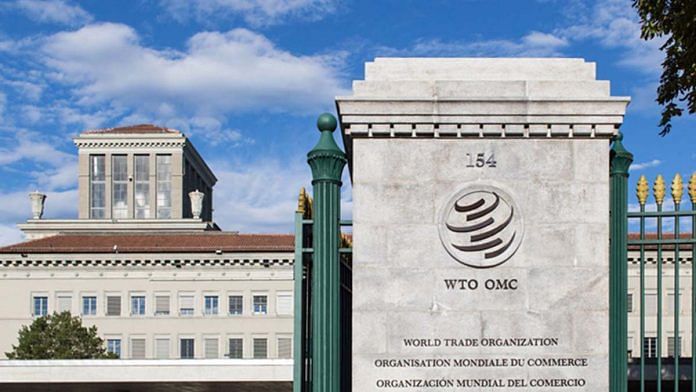New Delhi: The General Council of the World Trade Organisation (WTO) is set to take up a proposal floated by India and South Africa in October to temporarily suspend intellectual property rights (IPR) to make Covid-19 vaccines, medicines and medical devices accessible to poorer countries.
The Geneva-based WTO General Council, the highest decision-making body for setting global trading rules, is scheduled to take up the proposal Thursday.
Ever since the bid was first taken up at the TRIPS Council of the WTO on 15-16 October, a group of developed countries and blocks such as the US, European Union (EU), Canada, Australia, Japan, Switzerland and the UK have vehemently protested it. They are keen on safeguarding the interests of pharmaceutical conglomerates such as Pfizer, Moderna and AstraZeneca, among others, official sources told ThePrint.
On Thursday, the WTO council will be deliberating the proposal based on the decision made by the TRIPS Council earlier.
India and South Africa had jointly submitted the proposal on 2 October seeking relaxations for intellectual property, patents and other such provisions laid out under the Agreement on Trade-Related Aspects of Intellectual Property Rights, also known as TRIPS Agreement of the WTO.
The official sources said while China is backing the proposal along with other developing countries that constitute the G-33, or the Group of 33 developing countries, Brazil is the only exception that has not supported the call.
“The attack on India is huge and it has turned into one of the most controversial debates at the WTO since it involves IP and patents that the big pharma companies are not ready to be flexible on. They are up in arms,” said a source, who is involved in the talks, but didn’t wish to be identified.
“The developed countries feel India is pushing for this move since it cannot produce quality Covid vaccines, medicines or the required technology to fight the pandemic,” the source added.
Under the joint proposal, India has sought removal, or waiver, of Sections 1, 4, 5, and 7 of Part II of the TRIPS Agreement that pertain to copyright, industrial designs, patents and protection of undisclosed information or trade secrets, for Covid-related drugs and vaccines.
In a statement, the EU said, “There is no evidence that IP rights in any way hamper access to COVID-19-related medicines and technologies.”
WTO norms state that any proposal presented by a member country can only be accepted if all 164 member-countries approve it.
“Providing monopoly control over key medical tools to a single corporation in a pandemic is both unjustified and counterproductive. Such monopoly control hampers the scale up of production needed to ensure global equitable access to medical products to end the pandemic,” Leena Menghaney, who is Global IP Advisor at humanitarian medical non-profit Medecins Sans Frontieres, told ThePrint.
“Defending monopoly protection also contradicts the call for COVID-19 medicine and vaccines to be treated as global public goods,” Menghaney added.
Also read: After HCQ, India pushes vaccine diplomacy in S. Asia as China rushes in with its Covid shots
India’s diplomatic drive
To garner support for its joint proposal, the Narendra Modi government has also activated its diplomatic channels.
On Wednesday, the Ministry of External Affairs conducted a tour of over 60 heads of missions in India to visit Hyderabad’s biotech companies such as Bharat Biotech and Biological E that are engaged in manufacturing Covid vaccine candidate, Covaxin.
On 6 November, Foreign Secretary Harsh V. Shringla held an extensive briefing session for diplomatic missions and international organisations.
According to Medecins Sans Frontieres, past precedents and emerging evidence demonstrate how IP is a growing barrier to Covid medicines and technologies.
In March this year, South Africa faced challenges accessing key chemical reagents for Covid diagnostic testing due to proprietary protection on the machines and the reagents. In the same month, Swiss pharma major Roche rejected a request from the Netherlands to release the recipe of key chemical reagents needed for increasing production of diagnostic kits. The firm released it only after facing pressure from the European Commission.
Also read: West making India party to ‘anti-China’ policies like Indo-Pacific, Quad — Russian minister



